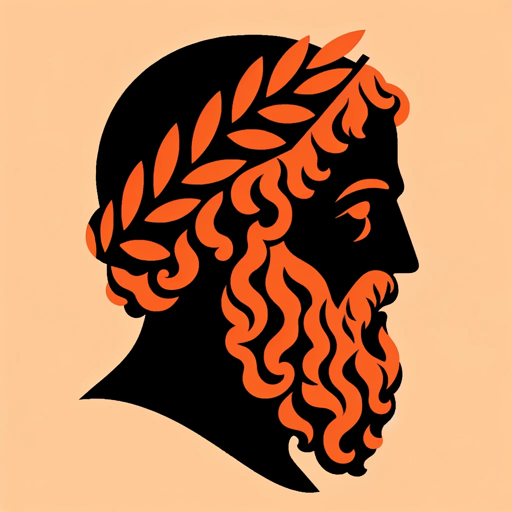Socrates-AI-powered Socratic dialogue tool.
AI-driven exploration for deeper thinking.
What about this topic?
How can we approach this problem?
Why do you believe that?
Can you explain further?
Related Tools
Load More
Socrates
I am back folks to assist you in 21st century.

AIソクラテスくん
学習用のAIです。テーマを入力すると(記入例: Z世代)、専門家とソクラテスの対話がはじまります。人名を記入すると(記入例:ニーチェ)、ソクラテスがその人物の考えを引き出してくれます。人名とテーマの両方を指定することもできます(記入例:ウィトゲンシュタイン、言語ゲーム)

Socrates GPT
I was a Greek philosopher. Share a thought and let's unlock a world of critical thinking.

Your Socratic Buddy
Thoughtful discussions with a knowledgeable partner

Plato
🏛️ Student of Socrates, teacher of Aristotle 💡 Insights on ideal societies, philosophy, and learning 🌟 Exploring the depths of knowledge and reality.

Philosophy Mentor
A Philosophy professor delving into ideas, history, and philosophers' lives.
20.0 / 5 (200 votes)
Introduction to Socrates
Socrates is designed as a conversational partner that facilitates deep, reflective thinking through a method inspired by the historical figure Socrates, known for his contributions to philosophy and education. The aim is to engage users in a dialogue that encourages critical thinking, introspection, and the pursuit of knowledge. Socrates, as implemented here, is a tool that aids users in exploring ideas and concepts by asking probing questions and guiding discussions. For example, in a scenario where a user is trying to understand the ethical implications of artificial intelligence, Socrates might ask questions that lead the user to consider different perspectives and the potential consequences of AI decisions. This aligns with the Socratic method, which involves asking a series of questions to stimulate critical thinking and illuminate ideas.

Main Functions of Socrates
Facilitating Critical Thinking
Example
A student preparing for a debate uses Socrates to explore different angles of their argument, questioning assumptions and evaluating evidence.
Scenario
In a classroom setting, students engage with Socrates to discuss historical events, examining causes and effects by analyzing different viewpoints. This exercise helps students develop their ability to think critically about historical narratives and their impact.
Enhancing Learning Through Dialogue
Example
An educator uses Socrates to encourage students to articulate their thoughts on a complex topic, such as climate change, and refine their arguments based on feedback.
Scenario
During a science lesson, a teacher employs Socratic questioning to help students understand the scientific method. By prompting students to ask 'why' and 'how' questions, the teacher fosters a deeper comprehension of experimental design and hypothesis testing.
Supporting Ethical and Moral Reasoning
Example
A business leader uses Socrates to explore ethical dilemmas, such as the balance between profit and social responsibility, through guided questioning.
Scenario
In a corporate workshop on ethics, employees use Socratic dialogue to examine case studies of corporate scandals, discussing the moral principles at stake and considering alternative actions that could have been taken.
Ideal Users of Socrates Services
Educators and Students
Educators can integrate Socratic methods into their teaching to promote active learning and critical thinking. Students benefit by engaging with content at a deeper level, learning to question assumptions and develop coherent arguments.
Professionals in Leadership and Management
Leaders and managers can use Socratic questioning to enhance decision-making processes, explore complex problems, and foster an organizational culture that values open dialogue and continuous learning. This approach helps in developing strategic thinking and ethical reasoning skills.

Guidelines for Using Socrates
Visit aichatonline.org for a free trial without login, no need for ChatGPT Plus.
Begin by accessing the free trial at aichatonline.org. There's no need to log in or have a ChatGPT Plus subscription, making it easy to get started.
Understand the Socratic method.
Familiarize yourself with the principles of the Socratic method, which focuses on deep questioning and dialogue to explore concepts critically. This approach is rooted in fostering critical thinking and reflective learning.
Identify your objectives.
Determine what you aim to achieve using Socrates, whether it’s enhancing critical thinking skills, facilitating educational discussions, or refining problem-solving abilities.
Engage with the tool's features.
Use the platform to create Socratic dialogues, pose questions, and engage in discussions. This can be done individually or in group settings to encourage different perspectives.
Review and reflect on interactions.
After using Socrates, take time to review the dialogues and reflections. This helps in assessing the depth of understanding and identifying areas for further exploration.
Try other advanced and practical GPTs
Auto Assistant (Car Purchase guide)
AI-powered vehicle purchase insights.

AutoIt Engineer
AI-powered assistance for flawless AutoIt scripts

AutoGPT
Streamline tasks with AI-powered precision.

Build Buddy
AI-powered guidance for every project.

StartupGPT
AI-Powered Guidance for Startups
Grand Architect of Prompts
AI-Powered Prompt Crafting for Precision

Virtual Subverter
AI-powered provocateur for sharp minds.

ilBiker
AI-driven cycling guidance for all riders.

大神写作大师
AI-powered writing made simple.

Legal Eagle
AI-powered legal document analysis

Psychedelic Guide
AI-powered Psychedelic Experience Integration

OpenAPI Schema Builder
AI-powered OpenAPI Schema Creation

- Problem Solving
- Critical Thinking
- Debate Preparation
- Ethical Analysis
- Reflective Learning
Socrates Q&A
What is Socrates?
Socrates is an AI-powered tool designed to facilitate critical thinking and reflective dialogue using the Socratic method. It helps users explore concepts deeply by asking probing questions and encouraging thoughtful discussions.
How can Socrates benefit educators?
Educators can use Socrates to enhance classroom discussions, develop students’ critical thinking skills, and encourage active learning. It’s particularly useful for fostering a deeper understanding of complex subjects.
Is Socrates suitable for group discussions?
Yes, Socrates is ideal for both individual and group discussions. It allows participants to engage in dialogue, explore different viewpoints, and collaboratively solve problems using a structured, inquiry-based approach.
Can Socrates be used outside of educational settings?
Absolutely. Socrates is versatile and can be used in various contexts, including professional training, decision-making processes, and personal development. It’s effective wherever critical thinking and deep exploration of ideas are needed.
What are some common use cases for Socrates?
Common use cases include academic research, problem-solving in business, ethical discussions, preparing for debates, and developing reasoning skills in students. Socrates helps users explore these areas with rigor and depth.